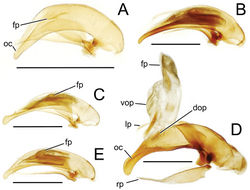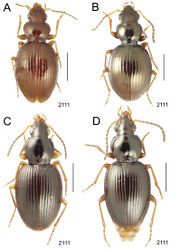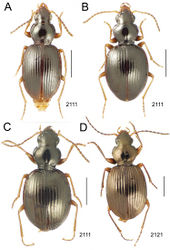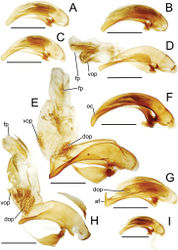Mecyclothorax globosoides
| Notice: | This page is derived from the original publication listed below, whose author(s) should always be credited. Further contributors may edit and improve the content of this page and, consequently, need to be credited as well (see page history). Any assessment of factual correctness requires a careful review of the original article as well as of subsequent contributions.
If you are uncertain whether your planned contribution is correct or not, we suggest that you use the associated discussion page instead of editing the page directly. This page should be cited as follows (rationale):
Citation formats to copy and paste
BibTeX: @article{Liebherr2013ZooKeys322, RIS/ Endnote: TY - JOUR Wikipedia/ Citizendium: <ref name="Liebherr2013ZooKeys322">{{Citation See also the citation download page at the journal. |
Ordo: Coleoptera
Familia: Carabidae
Genus: Mecyclothorax
Name
Mecyclothorax globosoides Perrault, 1989: 62 – Wikispecies link – Pensoft Profile
Identification
Along with abundant Mecyclothorax globosus of Marau and Aorai (Fig. 46B), and Mecyclothorax paraglobosus from Pito Hiti (Fig. 46C), this species (Fig. 45B) can be diagnosed by the basally constricted pronotum, broadly ellipsoid elytra, shallow yet punctate elytral striae, and setal formula 2111. But this species is easily distinguishable from the other two by the very reduced microsculpture. The frons is glossy, with micropunctures visible but indistinct transverse sculpticells discernible only near the margins of fields of reflected light. The pronotal disc is also glossy with indistinct, very elongate transverse sculpticells similarly traceable near the edges of reflected light, and the discal elytral intervals are completely smooth, their surfaces glossy, with the cuticle at most with irregular wrinkles and undulations. The male aedeagal median lobe is evenly narrowed apically to a slightly asymmetrical apex, the tip slightly downturned (Fig. 43E). Should a comparison be necessary, the lobe apex is more similar to that seen in males of Mecyclothorax paraglobosus (Fig. 47D) than to those of Mecyclothorax globosus (Figs 47A–C), though more narrowly rounded than either. Standardized body length 3.5–4.0 mm.
Distribution and habitat
This is the most commonly encountered species on Mont Teatara, Tahiti Iti. Perrault’s (1989)[1] type series included 214 individuals obtained by beating vegetation. More recent records document this species’ very diverse occurrences, with individuals found associated with living and dead growths of Astelia, living and rotten Freycinetia, moss-covered Weinmannia trunks and logs, and Dicranopteris ferns, both living and dead. and in dense banks. Individuals have been found from 1050–1195 m elevation.
Taxon Treatment
- Liebherr, J; 2013: The Mecyclothorax beetles (Coleoptera, Carabidae, Moriomorphini) of Tahiti, Society Islands ZooKeys, 322: 1-170. doi
Other References
- ↑ Perrault G (1989) La faune des Carabidae de Tahiti: IX. révision du genre Mecyclothorax (Sharp) (Psydrini) 4. le groupe de M. globosus Britton (Coleoptera). Nouvelle Revue d’Entomologie (NS) 6: 57-70.
Images
|



